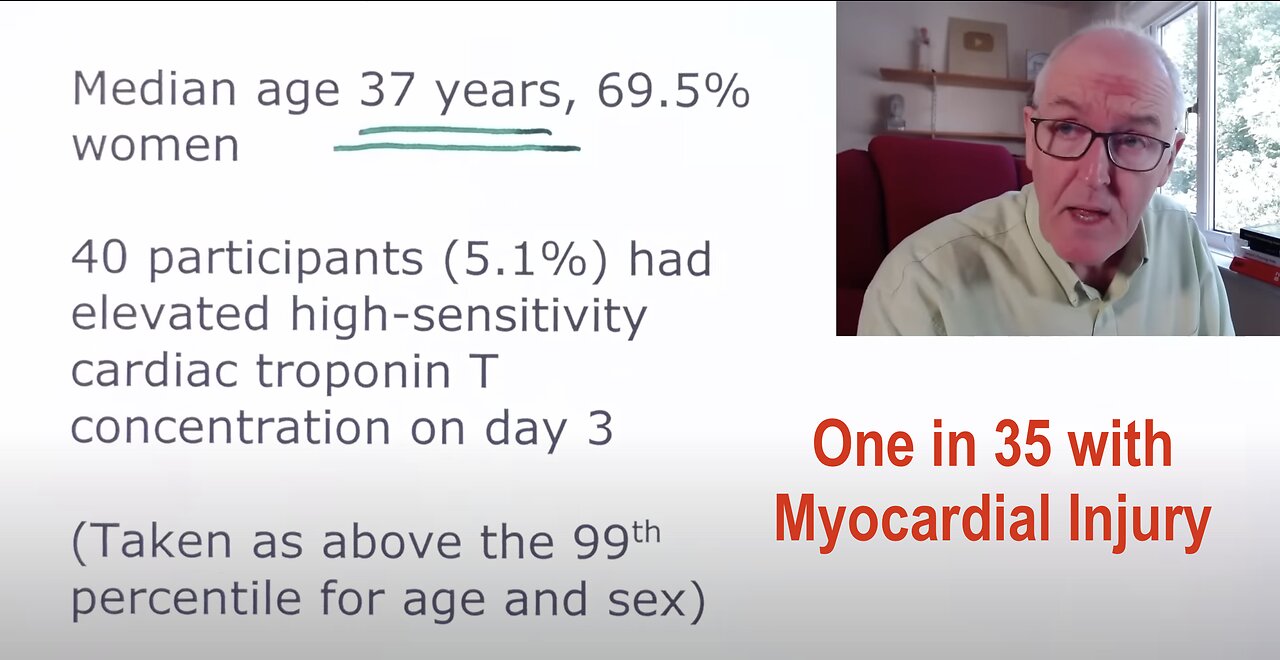Premium Only Content

One in 35 Have Myocardial injury
Myocardial Injury after COVID-19 mRNA-1273 Booster Vaccination
https://onlinelibrary.wiley.com/doi/epdf/10.1002/ejhf.2978
Department of Cardiology and Cardiovascular Research Institute Basel
(ESC Heart Failure, open-access journal of the Heart Failure Association of the European Society of Cardiology)
Prospective active surveillance study
(Not a retrospective passive surveillance study)
Industry independent, instigated by the investigators
Aims
Incidence and potential mechanisms of oligosymptomatic myocardial injury,
following COVID-19 mRNA booster vaccination.
Safety net for those already boosted,
screening and prevention of complications
Methods and Results
December 2021 to February 2022
Hospital employees scheduled to undergo mRNA-1273 booster vaccination,
assessed for mRNA-1273 vaccination-associated myocardial injury,
defined as acute dynamic increase in high-sensitivity cardiac troponin T (hs-cTnT) concentration,
above the sex-specific upper-limit of normal on day 3 (48-96h)
after vaccination without evidence of an alternative cause.
777 participants
Median age 37 years, 69.5% women
40 participants (5.1%) had elevated high-sensitivity cardiac troponin T concentration on day 3
(Taken as above the 99th percentile for age and sex)
mRNA-1273 vaccine-associated myocardial injury was adjudicated in 22 participants (2.8%).
One in 35 recipients (2.8%) had vaccine-associated myocardial injury
Of the 777, 2 women had chest pain
Of these 22 cases with mRNA-1273 vaccine-associated myocardial injury
Twenty cases occurred in women
Two in men
Hs-cTnT-elevations were mild and only temporary.
No patient had ECG- changes,
none developed major adverse cardiac events within 30 days
In the overall booster cohort
hs-cTnT concentrations, on day 3
Median 5 ng/L, IQR, 4-6
Matched controls (n=777), 3 ng/L IQR, 3-5
Significantly higher p less than 0.001
(If elevated on day3, given warning, investigations and advice)
No MACE (major adverse cardiac events) within 30 days
Cases had comparable systemic reactogenicity
Concentrations of cytokines and cytokine antagonists were markers quantifying systemic inflammation
Lower concentrations
GM-CSF (Granulocyte-Macrophage Colony Stimulating Factor) induces the development of monocytes, neutrophils, eosinophils, and myeloid and dermal dendritic cells.
IFN- λ1(IL-29) a group of anti-viral cytokines, that consists of four IFN-λ molecules
Conclusion
mRNA-1273 vaccine-associated myocardial injury was more common than previously thought,
being mild and transient,
and more frequent in women versus men.
The possible protective role of IFN-λ1(IL-29) and GM-CSF warrant further studies.
Similar Pfizer studies
A prospective study on myocardial injury after BNT162b2 mRNA COVID-19 fourth dose vaccination in healthy persons
https://pubmed.ncbi.nlm.nih.gov/36097844/
A prospective study on myocardial injury after BNT162b2 mRNA COVID-19 fourth dose vaccination in healthy persons
-
 2:02:46
2:02:46
Don't Obey
4 months agoBrave TV - Ep 1792 - The Las Vegas Shooting Assassination Attempt on Mohammed bin Salman
11.5K8 -
 LIVE
LIVE
Right Side Broadcasting Network
1 day agoLIVE REPLAY: President Donald J. Trump Holds His First Rally After Inauguration in Las Vegas - 1/25/25
3,549 watching -
 2:55:24
2:55:24
Jewels Jones Live ®
1 day agoWEEK ONE IN REVIEW | A Political Rendezvous - Ep. 107
141K45 -
 1:33:29
1:33:29
Michael Franzese
1 day agoTrump Wastes No Time: Breaking Down Trump’s First Week Executive Orders | LIVE
148K136 -
 1:26:44
1:26:44
Tactical Advisor
21 hours agoTrump Starting Strong/Shot Show Recap | Vault Room Live Stream 015
105K9 -
 10:18
10:18
MrBigKid
16 hours ago $2.41 earnedInsanely Compact Hunting Tripod you HAVEN'T heard of... Revolve
58.6K5 -
 20:29
20:29
marcushouse
23 hours ago $8.58 earnedUnleashing the Power of SpaceX's Starship: Why is it a Big Deal!?
92.4K28 -
 10:46
10:46
Rethinking the Dollar
1 day agoTrump Knows 'The Real Threat' To Your National Security
67.2K22 -
 17:13
17:13
Degenerate Jay
20 hours ago $1.52 earnedWB Games Is Falling Apart
49K4 -
 9:07
9:07
Bearing
23 hours agoElon Causes a Stir 🤣
38K69